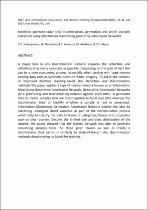 ResearchSpace
ResearchSpace
Synthetic aperture radar ship discrimination, generation and latent variable extraction using information maximizing generative adversarial networks
JavaScript is disabled for your browser. Some features of this site may not work without it.
- ResearchSpace
- →
- Research Publications/Outputs
- →
- Conference Publications
- →
- View Item
| dc.contributor.author |
Schwegmann, Colin P

|
|
| dc.contributor.author |
Kleynhans, Waldo

|
|
| dc.contributor.author |
Salmon, BP

|
|
| dc.contributor.author |
Mdakane, Lizwe W

|
|
| dc.contributor.author |
Meyer, Rory GV

|
|
| dc.date.accessioned | 2018-01-15T09:58:19Z | |
| dc.date.available | 2018-01-15T09:58:19Z | |
| dc.date.issued | 2017-07 | |
| dc.identifier.citation | Schwegmann, C.P. et al. 2017. Synthetic aperture radar ship discrimination, generation and latent variable extraction using information maximizing generative adversarial networks. 2017 IEEE International Geoscience and Remote Sensing Symposium (IGARSS), 23-28 July 2017, Fort Worth, TX, USA | en_US |
| dc.identifier.uri | http://hdl.handle.net/10204/9954 | |
| dc.description | Copyright: 2017 IEEE. Due to copyright restrictions, the attached PDF file only contains the abstract of the full text item. For access to the full text item, please consult the publisher's website. | en_US |
| dc.description.abstract | A major task in any discrimination scenario requires the collection and validation of as many examples as possible. Depending on the type of data this can be a time consuming process, especially when dealing with large remote sensing data such as Synthetic Aperture Radar imagery. To aid in the creation of improved machine learning-based ship detection and discrimination methods this paper applies a type of neural network known as an Information Maximizing Generative Adversarial Network. Generative Adversarial Networks pit a generating and discriminating network against each other. A generator tries to create samples that are indistinguishable from real data whereas the discriminator tries to identify whether a sample is real or generated. Information Maximizing Generative Adversarial Network extend this idea by extracting untangled latent variables as part of the discrimination process which help to classify the data in terms of categories/classes and properties such as ship rotation. Despite the limited size and class distribution of the dataset, the paper showed that the trained network was able to generate convincing samples from the three given classes as well as create a discriminator that performs similarly to state-of-the-art ship discrimination methods despite using no labels for training. | en_US |
| dc.language.iso | en | en_US |
| dc.publisher | IEEE | en_US |
| dc.relation.ispartofseries | Worklist;20045 | |
| dc.subject | Marine vehicles | en_US |
| dc.subject | Synthetic aperture radar | en_US |
| dc.subject | Generators | en_US |
| dc.subject | Oceans | en_US |
| dc.subject | Gallium nitride | en_US |
| dc.subject | Remote sensing | en_US |
| dc.title | Synthetic aperture radar ship discrimination, generation and latent variable extraction using information maximizing generative adversarial networks | en_US |
| dc.type | Conference Presentation | en_US |
| dc.identifier.apacitation | Schwegmann, C. P., Kleynhans, W., Salmon, B., Mdakane, L. W., & Meyer, R. G. (2017). Synthetic aperture radar ship discrimination, generation and latent variable extraction using information maximizing generative adversarial networks. IEEE. http://hdl.handle.net/10204/9954 | en_ZA |
| dc.identifier.chicagocitation | Schwegmann, Colin P, Waldo Kleynhans, BP Salmon, Lizwe W Mdakane, and Rory GV Meyer. "Synthetic aperture radar ship discrimination, generation and latent variable extraction using information maximizing generative adversarial networks." (2017): http://hdl.handle.net/10204/9954 | en_ZA |
| dc.identifier.vancouvercitation | Schwegmann CP, Kleynhans W, Salmon B, Mdakane LW, Meyer RG, Synthetic aperture radar ship discrimination, generation and latent variable extraction using information maximizing generative adversarial networks; IEEE; 2017. http://hdl.handle.net/10204/9954 . | en_ZA |
| dc.identifier.ris | TY - Conference Presentation AU - Schwegmann, Colin P AU - Kleynhans, Waldo AU - Salmon, BP AU - Mdakane, Lizwe W AU - Meyer, Rory GV AB - A major task in any discrimination scenario requires the collection and validation of as many examples as possible. Depending on the type of data this can be a time consuming process, especially when dealing with large remote sensing data such as Synthetic Aperture Radar imagery. To aid in the creation of improved machine learning-based ship detection and discrimination methods this paper applies a type of neural network known as an Information Maximizing Generative Adversarial Network. Generative Adversarial Networks pit a generating and discriminating network against each other. A generator tries to create samples that are indistinguishable from real data whereas the discriminator tries to identify whether a sample is real or generated. Information Maximizing Generative Adversarial Network extend this idea by extracting untangled latent variables as part of the discrimination process which help to classify the data in terms of categories/classes and properties such as ship rotation. Despite the limited size and class distribution of the dataset, the paper showed that the trained network was able to generate convincing samples from the three given classes as well as create a discriminator that performs similarly to state-of-the-art ship discrimination methods despite using no labels for training. DA - 2017-07 DB - ResearchSpace DP - CSIR KW - Marine vehicles KW - Synthetic aperture radar KW - Generators KW - Oceans KW - Gallium nitride KW - Remote sensing LK - https://researchspace.csir.co.za PY - 2017 T1 - Synthetic aperture radar ship discrimination, generation and latent variable extraction using information maximizing generative adversarial networks TI - Synthetic aperture radar ship discrimination, generation and latent variable extraction using information maximizing generative adversarial networks UR - http://hdl.handle.net/10204/9954 ER - | en_ZA |





